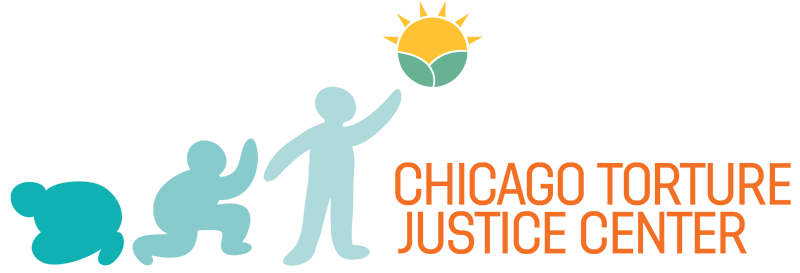Meeting the fullness of the moment
Like so many organizations and individuals collectively working for racial and social justice across the country, the Chicago Torture Justice Center exists between the world we have and the world we want. Now, in a world reckoning with pandemic—of disease, of racist violence and long-term community divestment—we don’t look to define as much as to envision. At our core is the fight against racialized state violence and its attempt to reproduce mechanisms of harm that erase the past, dominate the present, and steal the future. To change the dynamics of racialized violence requires an interruption of these mechanisms and the emergence of our collective ability to imagine past what power deems possible.
At the Center we are often asking ourselves a set of questions that guides all of our work. Who does it serve when our communities are unwell? What would be possible if we were well? What would wellness look like if we all had what we needed, if we were not limited by the conditions we have now?
Professor, activist, and abolitionist scholar Ruth Wilson Gilmore says, “Abolition is life in rehearsal. Not a repetition of rules.” As understanding of abolition as an idea grows, the collective opportunity for strength and invention committed to liberation grows with it. At CTJC, we are creating a model for community-based practice called politicized healing. Politicized healing acknowledges that our healing is political and that our politics can be healing. It addresses and seeks to transform harm, felt by individuals and communities, caused by historic and evolving systems of oppression.
We unapologetically push back against ableist and capitalist narratives about what actions, skills, or knowledge hold value—narratives that inevitably lead to exclusion and division. The creation of the liberatory and transformative futures we envision will require contributions from each of us. Each of these contributions are equally necessary, equally brilliant, equally revolutionary.
The urgent response to the state-sponsored murder of George Floyd, Breonna Taylor, Ahmaud Arbery—and more than 160 other Black people in the first 8 months of 2020—is the result of organizing that is always happening in Black communities. Black Lives Matter and other groups did not decide in the wake of George Floyd’s murder to engage abolition goals. The work of abolition is generations in the making. Historically, our Black communities have paved ways for action that declare and uplift the work of Black liberation—and new history is in the making. Channeling our ancestors, the current moment manifests the tools we need not just to survive, but to flourish.
This reality, one CTJC is grounded in everyday, refutes the idea that our communities need help, that we don’t have our own wisdom and skills, and that we should be grateful for the scant social services and safety nets in place. Instead, we know we are enough and that there is enough. From this foundation of abundance, our work is to not continue the extraction of resources to serve and protect the few but to instead sow, harvest, and distribute in manners that allow for the flourishing of our communities and our land.
The four centuries since 1619 hold for us creative and dynamic strategies for liberation—in maroon communities and the Underground Railroad, in stories of resistance and survival in Tulsa, in the formation of Black unions and farmers’ cooperatives, in the Black Power movement, in organizing to abolish—still, to abolish: slavery, convict leasing, Jim and Jane Crow laws, the prisons and carceral systems that perpetuate these histories on a continual loop. And, throughout these centuries, solidarity with other groups impacted by oppression.
When we lift up those tortured by former Chicago police commander Jon Burge and by all officers who engaged in torture then and now, when we speak out for those known and yet to be known who have survived or who we have lost to police violence, we join a very long line of people who have had the courage and the love to say: No More.
Politicized Healing: how we heal, dismantle, and create together
Ruth Wilson Gilmore also talks about abolition not as absence but as presence, as a movement centered in building “life-affirming institutions.” The absence—what Gilmore calls abandonment—of access to wellness in all its forms is not solely a looting of a community’s rightful resources, it is an active destruction of its members and their spirits. At CTJC, this presence looks like attention, care, coalition, consideration, accountability, specificity, consequences, communal responsibility, lasting connection. Through our model, which we describe as politicized healing, our work seeks to:
Heal - Engage in a self-determined process of restoring ourselves and connecting to others and what we care about
Dismantle - Unapologetically expose and deconstruct systems of harm
Create - Build reparative power that realizes new paradigms that we collectively imagine for our communities
In centering the survivors and communities we serve and using politicized healing as a methodology, CTJC has created programs to meet the specific requests and needs of those impacted by racialized state violence. One participant in our Freedom Songbook program, which engages community members in group singing as a vehicle for healing, described the impact of that resource:
“Expressing ourselves and knowing that others care about you. It’s therapeutic… Most importantly keep your hope and there are people that have your back.”
After joining our Realizing and Implementing Strategies to End Police Violence (or RISE) organizing meetings, one survivor shared this powerful reflection:
“I had been holding on to my story, my experiences, and my trauma for so long. RISE gave me the opportunity to clean out my closet of trauma—it was the first place that I ever spoke publicly about my experience at Area 2 Police Station. It was the first place where I knew that I was free to do so. That was two years ago and I haven’t stopped, I won’t stop. It is because of this space that I am free—INDEED. I don’t carry the burdens of guilt or shame. I am clothed in courage and I am encompassed by strength and solidarity that only pain, empathy, and passion can create.”
As we continue to implement and imagine the work of the Center, we create individual and collectively embodied practices that respond to injustices of the past and present. In these ways, we seek to sustain, and grow the powerful presence of love and liberation that has always been in the Black community. We are moving forward guided by imagination, power, and connection to ourselves and one another.
An Invitation
The designed, historic privatization of services points to a deeper wound and a need for reckoning. Hoarding by white supremacist systems has denied Black and brown communities access to housing, healthcare, employment, quality schools, and green spaces. We reject the myth of scarcity that perpetuates systemic inequity and structural violence, and we affirm that we can present ourselves with the things we need—not as aspirations but as lived realities. We see this presence all around us: in mutual aid support, in local grassroots leadership, in calls for justice being nurtured and growing louder everywhere we look.
The very existence of the Center, one based on historical reparations legislation that many thought would never come to pass, is evidence of the power of politicized healing. Knowing we are not bound by the institutions that have failed so many, we widen our imagination. We live our values, including accountability and an understanding about the worth of every individual, with eyes towards what we can become.
Politicized healing is a way forward we offer to others. We know we can do more together, and that we need each other to take on the systems that hurt us personally, generationally, collectively. We know that, as Mariame Kaba has observed, “Everything worthwhile is done with other people.” In this spirit, we share our liberatory model and welcome you to join us in its ongoing rehearsal.

